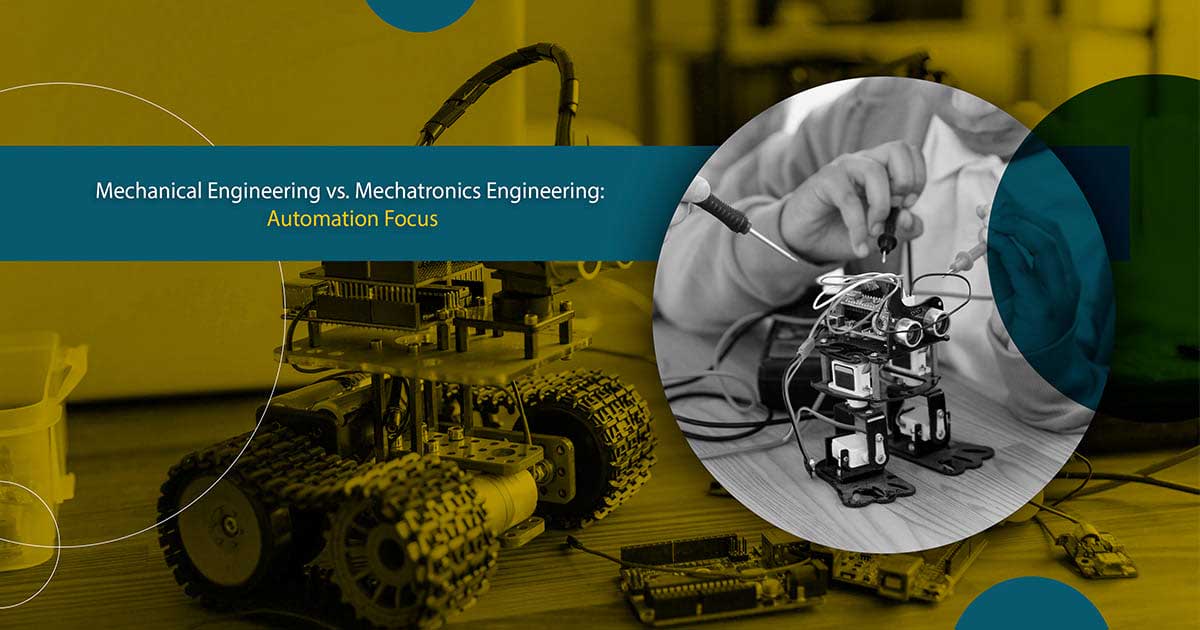FET Blogs


FET Blogs



22 April 2024
Table of Contents:
Mechanical Engineering and Mechatronics Engineering are closely related yet distinct fields within the broader engineering domain. Both fields deal with mechanical systems' design, analysis, and manufacturing, but they have unique focuses and applications. Both fields offer excellent prospects, and the decision between the two needs to align with your interests and the direction you envision for your engineering career.
Mechanical engineering is a foundational engineering discipline focusing on designing, analysing, and manufacturing mechanical systems. It forms the backbone of various industries, from automotive and aerospace to energy and manufacturing. It involves working on diverse projects, from designing machinery and thermal systems to developing components for consumer products.
Mechatronics engineering, on the other hand, is a more specialised and interdisciplinary field that integrates mechanical engineering, electronics, computer science, and control engineering. It focuses on creating intelligent systems that merge mechanical components with electronic and software elements. Mechatronics engineers work on projects involving robotics, automation, and control systems.
The duration of mechanical and mechatronics engineering programmes is four years for a bachelor's degree. In both disciplines, the four-year duration is divided into semesters or quarters, covering a range of fundamental and specialised courses. The courses include a combination of theoretical coursework, laboratory work, and possibly internships or cooperative education experiences. The curriculum is designed to provide a strong foundation in both mechanical and electrical engineering principles.
The curriculum for mechanical engineering is diverse, covering a wide range of subjects within the field. Additionally, some elective courses allow students to specialise in areas like automotive engineering, aerospace engineering, energy systems, or robotics. Here are some standard courses that are taught:
Mechatronics engineering is an interdisciplinary field that combines mechanical engineering, electronics, computer science, and control engineering. The unique aspect of mechatronics is the integration of mechanical and electronic systems to create intelligent and automated products. The curriculum includes:
Mechanical engineers have many career opportunities due to their versatile skill set. They are sought after in various industries, including automotive, aerospace, energy, and manufacturing, due to their expertise in designing, analysing, and manufacturing mechanical systems. Some common career paths include:
Automotive engineers design and improve automotive systems, vehicle performance, safety, and fuel efficiency.
Mechanical design engineers focus on creating and improving mechanical systems and products. They collaborate with cross-functional teams to ensure designs meet technical specifications and standards.
Aerospace engineers work on aircraft and spacecraft design.
Manufacturing engineers work on optimising manufacturing processes and systems and implement cost-effective solutions to improve production efficiency. They ensure that products are manufactured with high quality and within budget constraints.
Thermal and fluids engineers specialise in studying heat transfer, fluid dynamics, and thermodynamics. They design systems such as HVAC (Heating, Ventilation, and Air Conditioning) and heat exchangers.
With their combined mechanical and electronic systems knowledge, mechatronics engineers are well-suited for roles involving automation and intelligent technologies. Mechatronics engineers are in demand in the robotics, automation, telecommunications, and healthcare industries. Career options include:
Robotics engineers design and programme robotic systems for automation and various applications. They integrate mechanical components with sensors, actuators, and control systems.
Automation engineers implement automated systems in manufacturing using a combination of hardware and software. They optimise systems for increased efficiency and reduced human intervention.
Embedded systems engineers work on embedded electronics in various devices that involve hardware and software integration. They design and programme microcontrollers and microprocessors for specific applications.
IoT (Internet of Things) engineers design connected systems for IoT applications.
Control systems engineers work on designing and implementing control systems for machines and processes. They utilise feedback mechanisms to ensure the stability and performance of systems and address challenges related to automation and precision control.
While mechanical engineering and mechatronics engineering share common foundational principles, they diverge in focus, course content, and career opportunities. The choice between the two fields depends on individual interests and career goals. If you are passionate about traditional mechanical systems and enjoy the broader spectrum of engineering applications, mechanical engineering might be the right fit. On the other hand, if you are intrigued by the prospect of working with cutting-edge technologies, intelligent systems, and automation, mechatronics engineering could be the path for you.
A1: Mechatronics and robotics engineering are ideal for automation careers.
A2: Mechatronics and automation have vast scope in robotics, manufacturing, and AI.
A3: Yes, mechanical engineers can work in automation with additional training.
A4: Automation engineers are highly sought after in manufacturing and tech.
Popular Post
17 February 2026
AIE Full Form
10 February 2026
AEIE Full Form
22 January 2026
AE Full Form
16 January 2026
What is Aerospace Engineering?
16 January 2026
What is Chemical Engineering?
Ask an Expert for Free